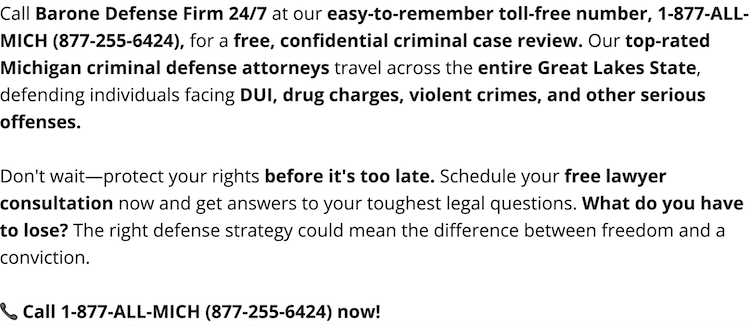Grand Rapids DUI Case Process
If you have a DUI case now pending in Grand Rapids, then you may want to hire a lawyer who is experienced in your specific court. A Grand Rapids DUI attorney from the Barone Defense Firm will do everything possible to help you obtain the best possible results. Your Grand Rapids DUI process will consist of the following.
Initial DUI Investigation and ArrestUnless you were in an accident, fell asleep in your car, or are otherwise not driving when the police first come into contact with you, the first step in the Michigan DUI process is usually the initial traffic stop. Most traffic stops occur after the police officer observes you violating the traffic code by speeding for example. You might also be stopped under suspicion of DUI as when the officer observes you driving in an erratic or dangerous way. During the stop, after approaching your car, the officer will ask you questions the purpose of which is to collect additional evidence that you are DUI. It is recommended that you politely decline to answer any questions until you have had the chance to speak with an attorney.
At the conclusion of the investigation, the police officer will arrest you, and if you agree, take you to the station for booking and a breathalyzer test. You will also have your fingerprints and mug shot taken. Depending on your breath test result you may have to stay behind bars for several hours or overnight.
The next step in your Grand Rapids DUI will be the arraignment. At this first court hearing the judge will read from the complaint, which is the charging document, and ask how you plead. Your options are to plead not guilty, guilty or no contest. Most courts however will not accept a guilty plea at the arraignment. After you enter your plea your bond will be set by the court.
Pre-TrialThe next stage in the Grand Rapids DUI process is called a pre-trial. At this hearing the prosecutor and defense lawyer will discuss your case, including certain matters and issues pertaining trial and usually will discuss the possibility of a negotiated plea deal. There may be several pre-trial conferences before your case is either resolved through a plea bargain or before it is set for a DUI trial.
Preparing for a DUI TrialPrior to the pretrial hearing either side, be it the prosecutor or the defense, may file one or more motions to prepare for the trial. A defense motion might be to compel discovery such as when the court’s order is necessary before receiving evidence from the prosecutor. Another motion might be one filed by your attorney to keep evidence out of the trial. An example would be a motion to suppress the breath test results or a motion to suppress statements made by the defendant after being arrested. After these motions are heard by the court, the parties may engage in further plea negotiations, and if the parties are still at a stalemate, then the case may be set for trial.
The DUI Trial in Grand RapidsYour Grand Rapids DUI case may be decided by either a judge or a jury. At the trial, the prosecutor must prove beyond a reasonable doubt that you were guilty of driving under the influence. If you and your attorney decide on a jury trial then of course your trial will start with jury selection. After both the prosecution and defense have selected the jury, the trial may begin.
During the trial, each side can present an opening statement the purpose of which is to explain what each side thinks the evidence will show. This is not the time to explain the evidence. That happens during the closing argument. Next comes the opening statement. Your attorney does not need to give an opening statement, call witnesses, or do anything at all because you have no burden of proof. However, it most cases your attorney will give an opening statement when invited to do so by the judge. Next, the prosecutor will call the arresting officer and any other witnesses. Your attorney may cross-examine those witnesses. After all witnesses have testified and evidence has been received by the court, each side will have the opportunity to give a closing argument. At this point the trial has concluded, and it will be up to the jury to decide how your Grand Rapids DUI case should be decided.
 Barone Defense Firm Home
Barone Defense Firm Home




















